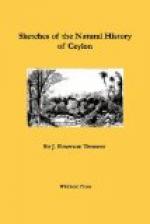“Now that Damon and Spintharus and Aristoxenus and Xenophilus and Philoxenus and others should know music excellently well, and for their cleverness be ranked amongst the few, is indeed a thing of wonder, but not incredible nor contrary at all to reason. For this reason that a man is a rational animal, and the recipient of mind and intelligence. But that a jointless animal ([Greek: anarthron]) should understand rhythm and melody, and preserve a gesture, and not deviate from a measured movement, and fulfil the requirements of those who laid down instructions, these are gifts of nature, I think, and a peculiarity in every way astounding. Added to these there were things enough to drive the spectator out of his senses; when the strewn rushes and other materials for beds on the ground were placed on the sand of the theatre, and they received stuffed mattrasses such as belonged to rich houses and variegated bed coverings, and goblets were placed there, very expensive, and bowls of gold and silver, and in them a great quantity of water; and tables were placed there of sweet-smelling wood and ivory very superb: and upon them flesh meats and loaves enough to fill the stomachs of animals the most voracious. When the preparations were completed and abundant, the banqueters came forward, six male and an equal number of female elephants; the former had on a male dress, and the latter a female; and on a signal being given they stretched forward their trunks in a subdued manner, and took their food in great moderation, and not one of them appeared to be gluttonous greedy, or to snatch at a greater portion, as did the Persian mentioned by Xenophon.




